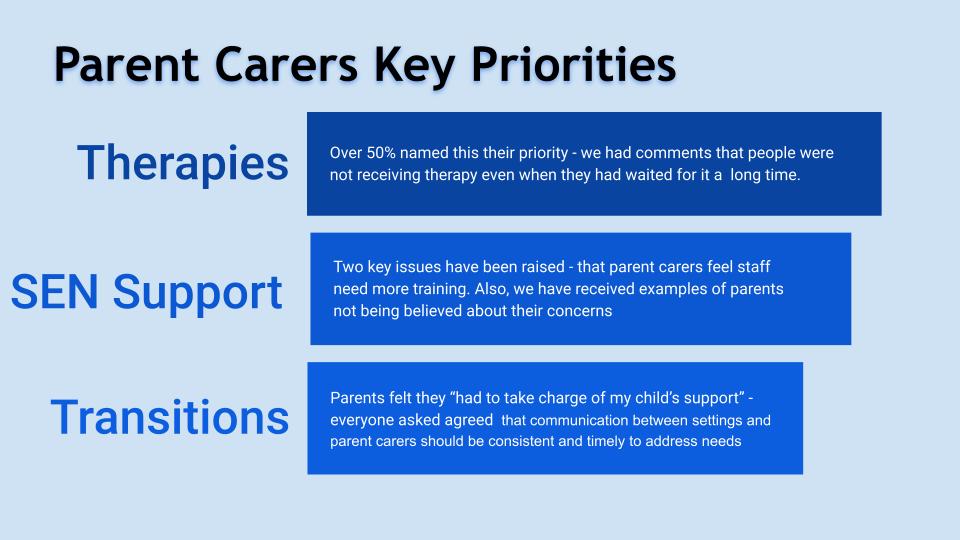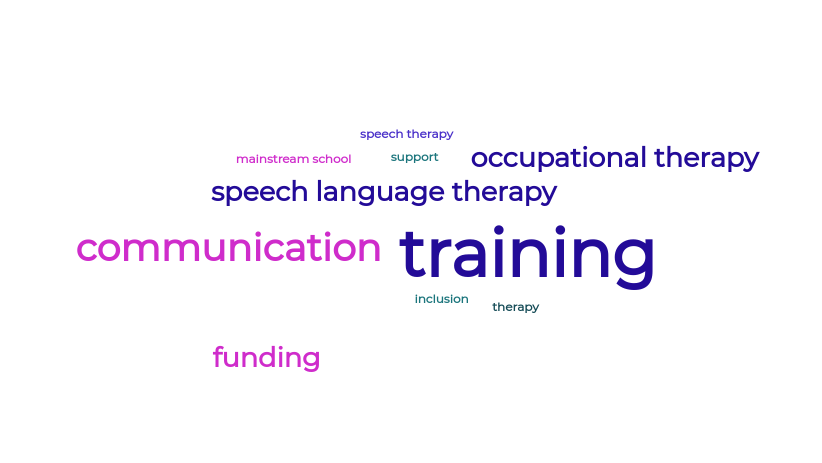SEND Futures Survey Responses
Following our focus groups in Summer term, we ran a survey of parent carers from the end of June to the end of September 2023. The purpose of this survey was to establish if the information we collected in those focus groups reflected the views of parent carers. Our intention was to gain a robust understanding of the issues faced by SEND parent carers and their children so that we could be part of a co-produced self evaluation by the local authority. All this information will inform the refreshed SEND Futures plan: the new plans for Special Educational Needs and Disabilities (SEND) service development in Kingston.
Achieving for Children will also be publishing separate survey results which go into much greater detail about individual families’ experience. We chose to ask parent carers if they agreed or disagreed with a series of statements which we had developed on the back of these workshops and have been published here in our key themes document.
Who responded to our survey?
We received nearly 40 responses to our survey which is in line with what we have previously achieved. We heard back from some families who had attended the focus groups and some new parent carers. Over 2/3rds of the people who responded had a child at primary school or younger. This is consistent with what we have found with our work as PCF – we have been able to reach more parent carers of younger children.
What was their response?
Here are the results for each statement, grouped by the key themes we identified in the focus groups
Key theme 1: Early Years
Our Analysis: Given the responses of agree and strongly agree were high, we particularly note that training is an important issue for parent carers for all Early Years staff they come across in both health and education. This was also a key issue raised to us at our engagement fun day in June 2022 so remains a priority for parent carers.
Key theme 2: Post Diagnosis Support
Our Analysis: Again parent carers felt there should be more done post diagnosis support, particularly reaching out to communities less involved with services. We are currently involved in a post-diagnosis service development and will be keen to see how this develops.
Key theme 3: SEN Support
Our Analysis: The main issue the cohort agreed on was that communication was a key way that their children could get their needs met. There was clearly varied experience in terms of SENCO involvement and most had some sort of plan.
Seeing these results reflects something we noted in our key themes document that there is some variability from school to school but that SENCOs can be a good support for the child and their parent carer.
Key Theme 4: Receiving Therapy Services
Our Analysis: Unfortunately we were not surprised to see that many had to wait a long time for therapy services.
The information from the focus groups and survey let us know that some people are also not receiving therapy services even if it is part of the therapy plan. We are aware that there was recently a report sent from Speech and Language services offering some options for what happens next.
Key Theme 5: Accessing an Education Health Care Plan
Our Analysis: The key information from this part of the survey is that parent carers can feel discouraged. Again they are asking for communication – in particular having access to those working on the case in the SEN team. This reflected what we learned at the
The statements are in the order of the following:
- The steps to apply and maintain an EHCP could be discouraging
- It helps if schools communicated with parent carers and worked together to produce EHCP.
- The change to the EHCP forms Post 16 over complicates getting support for young adults
- There needs to stronger communication between parent carers and professionals in the EHCP team
Key Theme 6: Transitions to post 16
This topic was not relevant to the majority of respondents but we have put some parent carers in contact with the team who are looking at preparing for adulthood at the Local Authority.
Our Analysis: Outside of this survey we have learned of some concerns with the transition from primary to secondary school so we continue to have conversations with parent carers around this topic.
We have made it our priority to reach out to the parent carers of secondary school and older.
Key Theme 7: Services in the Community
Our Analysis: The majority of parent carers wanted to have more access to services including short breaks, inclusive activities and family support. In addition it is particularly noticeable that parent carers were asking for peer support. We noticed this in our groups that parent carers were grateful to meet and speak with each other about their experiences. This will definitely motivate our work to get people together and give them an opportunity to share.
The statements in this graph are as follows:
- There needed to be work done with all local services so your SEND child could attend all activities, not only ones designed for SEND
- Parent carers need opportunity to be brought together as well as children and for there to be peer support
- Social care needed to look at a whole family picture and that family support was not always available.
What Next?

What else parent carers said?
In addition to this document, you can read the statement about the key themes from the focus group. This survey gave us an opportunity to get more detailed comments from parent carers. All these comments have been passed on directly to the local authority who we have worked with on the coproduction.
This word cloud represents the most repeated themes in the comments

In terms of what we have previously heard from parent carers at our SEND family fun day in 2022, we can see some similarities and so we will continue to concentrate on these areas as a parent carer forum.
produced by Claudia Isaby, Co-Chair Kingston PCF (September 2023)

